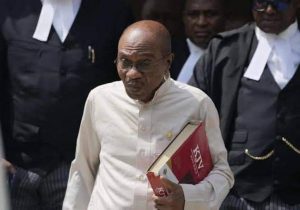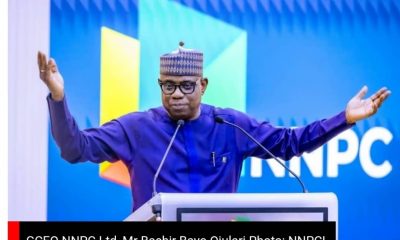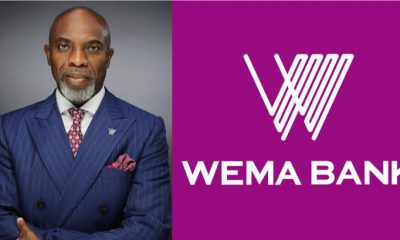Business
Emefiele operated 593 illegal US, UK, China accounts – CBN investigator

Emefiele operated 593 illegal US, UK, China accounts – CBN investigator
The former Central Bank of Nigeria Governor, Godwin Emefiele, illegally lodged billions of naira in no fewer than 593 bank accounts in the United States, United Kingdom, and China without the approval of the apex bank’s board of directors and the CBN Investment Committee.
The Special Investigator on the CBN and Related Entities, Jim Obaze, found that the ex-CBN governor lodged £543, 482,213 in fixed deposits in UK banks alone without authorisation.
When contacted, counsel for Emefiele, Mathew Bukkaa, SAN, asked one of our correspondents to send him a text message. He has yet to reply to the message as of the time of filing this report.
Meanwhile, Obaze submitted his final report tagged, ‘Report of the Special Investigation on CBN and Related Entities (Chargeable offences) to President Bola Tinubu on Wednesday.
The report partly read, “The former governor of CBN, Godwin Emefiele invested Nigeria’s money without authorization in 593 foreign bank accounts in the United States, China, and United Kingdom, while he was in charge.
“All the accounts where the billions were lodged have all been traced by the investigator.”
In a letter dated July 28, 2023, sighted by The PUNCH, President Bola Tinubu had named a former Executive Secretary of the Financial Reporting Council of Nigeria, Obazee, as the CBN special investigator,
Emefiele, who is currently in Kuje Custodial Centre, is being prosecuted for N1.2 billion procurement fraud.
He has not been able to perfect the N300m bail granted him by a High Court of the Federal Capital Territory on November 22.
However, documents obtained by our correspondent on Thursday indicated that the former apex bank governor might face fresh criminal charges over the handling of the CBN naira redesign policy.
Emefiele could be prosecuted for illegal issuance of currency under section 19 of the CBN Act alongside Tunde Sabiu, a former aide to former President Muhammadu Buhari, and 12 top directors of the CBN.
It was gathered that the naira redesign policy was sold to Buhari at the instance of Sabiu and that the initiative was done without the approval of the board of the CBN.
No approval
The investigator found that Buhari didn’t approve of the naira redesign. It was Tunde Sabiu who first told Emefiele in September 2022 to consider the redesign of the naira. On October 6, 2022, Emefiele wrote to Buhari that he wanted to redesign and reconfigure N1000, N500 and N200 notes.
“The former President tagged along but did not approve the redesign as required by law. Buhari merely approved that the currency be printed in Nigeria. The redesign was only mentioned to the board of the CBN on December 15, 2022, after Emefiele had awarded the contract to the Nigerian Security Printing and Minting Plc on October 31, 2022,’’ the documents noted.
Emefiele was said to have contracted the redesign of the naira to De La Rue of the UK for £205, 000 pounds under the vote head of the Currency Operations Department after the NSPM said it could not deliver the contract within a short timeframe.
The special investigator found that N61.5bn was earmarked for the printing of the new notes out of which N31.79bn had been paid.
As of August 9, 2023, findings revealed that N769bn of the new notes were in circulation.
The probe of the CBN also revealed the fraudulent use of N26.627tn Ways and Means of the Apex Bank as well as the misuse of the COVID-19 intervention fund.
For instance, the CBN under Emefiele at its 661st meeting held on October 27, 2020, approved that the Consolidated Revenue Fund Account should be debited with the sum of N124.860bn, and the decision was implemented on October 9.
Similarly, the Committee of Governors at its 670th meeting held on December 9, 2020, granted anticipatory approval ‘’pending receipt of a formal request by Mr President and ratification by the board of directors the payment of the sum of N250bn only to the Federal Government of Nigeria to address challenges as a result of low revenue inflow and the payment of salaries.
The decision was implemented on December 15, 2020.
Anticipatory approval
Also on December 30, 2020, the committee of governors at its 672nd meeting granted another anticipatory approval for N250bn to the Federal Government for payment of salaries pending receipt of a formal request by Mr President and ratification by the board of directors.
The apex bank’s management through the Finance and General Purpose Committee equally granted anticipatory approval on the investment of $200mn in equity warrants of the Africa Finance Corporation.
According to section 38 of the CBN Act, 2007, the CBN could grant temporary advances to the Federal Government in respect of temporary deficiency of budget revenue at an interest.
The section also provides that such advances are to be repaid by the end of the financial year in which they are granted otherwise, the CBN shall be stopped from granting such advances in the subsequent year.
The advance is not to be repaid by way of promissory note, securitization or issuance of treasury bills.
The CBN investigator discovered that the CBN Ways and Means was abused under the Buhari administration.
The document further said, “In an instance, they (senior CBN and government officials) padded what the former President Muhammadu Buhari approved with N198,963,162, 187. There are instances where no approvals are received from the former president and yet, N500bn is taken and debited to Ways and Means.
“There are more shocking instances where the erstwhile CBN governor and his four deputy governors connived to steal outright in order to balance the books of the CBN.
“This was by violently taking money from the Consolidated Revenue account and then charging it to Ways and Means. It was a total of N124.860bn. They even created the narration as a presidential subsidy and expanded the ways and Means portfolio to accommodate crime.
“The CBN officers and even the then acting CBN governor could not produce the Presidential Approval of most of the expenses described as ‘Ways and Means.’ When confronted, to provide the breakdown of the supposed N22.7trn that was presented to the 9th National Assembly to illegally securitise as ‘Ways and Means’ financing, they were only able to partially explain a total of N9.063 trn or N9.2trn depending on which official you are considering his submission and an unreasonable attribution of non-negotiated interest element of N6.5tn.
“This shows that this was the point where the officers of the immediate past administration as well as the erstwhile CBN governor and his four deputy governors connived, defrauded, and stole from the commonwealth of our country with the aid of civil servants.’’
Continuing, the report said, “The true position of the Ways and Means as documented from the reconciliation between the CBN and the Ministry of Finance at the time is N4,449,149,411,584.54.
“This may have been the main reason the past administration hurriedly sought that the advances of N22.7trn be securitised by the 9th National Assembly on December 19, 2022, which they also hurriedly did despite the fact that it contravenes section 38 of the CBN Act, 2007.”
Legal fees
The CBN under Emefiele was also said to have spent N1.7bn on questionable legal fees for 19 cases instituted against the naira redesign policy.
The investigator also discovered how Emefiele misrepresented the presidential approval for the NESI Stabilisation Strategy Limited approved by former president Goodluck Jonathan.
The document read, “The Presidential approval granted by then President Goodluck Jonathan was rightly stated by him NESI should be a company limited by guarantee but the Committee of Governors misled the Board of the CBN by relying on non-existent advice by the office of Attorney-General and Minister of Justice to incorporate a company limited by shares for which the allotted share capital exceeded the authorised share capital (See 380th meeting of the Committee of Governors held in January in January 2015) and allotting unauthorised share capital to Mr Godwin Emefiele and Mr Mudashiru Olaitan without lawful approval by the President.
“N1.325bn was stolen pre-incorporation and the money funnelled to four companies, including a legal firm which got N300mn.’’
Between 2015 and 2021, an investment company was said to have collected unlawfully a total of N4.89bn.
A breakdown indicated that the firm received N262mn in 2015, N464mn in 2016, N550mn in 2017, N726mn in 2018, N762 in 2019, N684 in 2020 and N1.44bn in 2021, totalling N4.89bn.
Emefiele also allegedly paid N17.2bn to 14 deposit money banks participating in the Nigerian Electricity Market Stabilisation Facility.
“A total of 14 DMBs engaged in the manipulation by unlawfully arranging and collecting 1.9535 per cent of the total disbursements paid to the DMBs participating in the Nigerian Electricity Market Stabilisation Facility.
The fees are paid to the banks in the ratio of their contributions to the NEMSF disbursement, according to External Auditor’s Notes to the Financial Statement of NESI Stabilisation Strategy Limited.
“The CBN also went further by authorising the issuance of debenture for the NESI SPV, starting with N64.8bn in 2015. By 2021, N952bn debenture had been issued. The investigator said the money was diverted from public funds,’’ the document further stated.
It was further gathered that Emefiele could be tried for alleged manipulation of the naira exchange rate, fraudulent implementation of the e-naira project, and exemption of three foreign firms from paying income tax.
Meanwhile, the investigation has uncovered the strange illegal withdrawal/theft of $6.23mn from the CBN vault by two persons who used a forged presidential letter.
The suspects currently in custody were said to have presented a forged letter on February 7 and 8, 2023, purportedly signed by Buhari to withdraw the money allegedly meant for payment for foreign election observation missions.
Business
Nigeria’s Inflation Drops to 15.10% as NBS Reports Deflationary Trend

Nigeria’s headline inflation rate declined to 15.10 per cent in January 2026, marking a significant drop from 27.61 per cent recorded in January 2025, according to the latest Consumer Price Index (CPI) report released by the National Bureau of Statistics.
The report also showed that month-on-month inflation recorded a deflationary trend of –2.88 per cent, representing a 3.42 percentage-point decrease compared to December 2025. Analysts say the development signals easing price pressures across key sectors of the economy.
Food inflation stood at 8.89 per cent year-on-year, down from 29.63 per cent in January 2025. On a month-on-month basis, food prices declined by 6.02 per cent, reflecting lower costs in several staple commodities.
The data suggests a sustained downward trajectory in inflation over the past 12 months, pointing to improving macroeconomic stability.
The administration of President Bola Ahmed Tinubu has consistently attributed recent economic adjustments to ongoing fiscal and monetary reforms aimed at stabilising prices, boosting agricultural output, and strengthening domestic supply chains.
Economic analysts note that while the latest figures indicate progress, sustaining the downward trend will depend on continued policy discipline, exchange rate stability, and improvements in food production and distribution.
The January report provides one of the clearest indications yet that inflationary pressures, which surged in early 2025, may be moderating.
Bank
Alpha Morgan to Host 19th Economic Review Webinar

Alpha Morgan to Host 19th Economic Review Webinar
In an economy shaped by constant shifts, the edge often belongs to those with the right information.
On Wednesday, February 25, 2026, Alpha Morgan Bank will host the 19th edition of its Economic Review Webinar, a high-level thought leadership session designed to equip businesses, investors, and individuals with timely financial and economic insight.
The session, which will hold live on Zoom at 10:00am WAT and will feature economist Bismarck Rewane, who will examine the key signals influencing Nigeria’s economic direction in 2026, including policy trends, market movements, and global developments shaping the local landscape.
With a consistent track record of delivering clarity in uncertain times, the Alpha Morgan Economic Review continues to provide practical context for decision-making in a dynamic environment.
Registration for the 19th Alpha Morgan Economic Review is free and can be completed via https://bit.ly/registeramerseries19
It is a bi-monthly platform that is open to the public and is held virtually.
Visit www.alphamorganbank to know more.
Business
GTBank Launches Quick Airtime Loan at 2.95%

GTBank Launches Quick Airtime Loan at 2.95%
Guaranty Trust Bank Ltd (GTBank), the flagship banking franchise of GTCO Plc, Africa’s leading financial services group, today announced the launch of Quick Airtime Loan, an innovative digital solution that gives customers instant access to airtime when they run out of call credit and have limited funds in their bank accounts, ensuring customers can stay connected when it matters most.
In today’s always-on world, running out of airtime is more than a minor inconvenience. It can mean missed opportunities, disrupted plans, and lost connections, often at the very moment when funds are tight, and options are limited. Quick Airtime Loan was created to solve this problem, offering customers instant access to airtime on credit, directly from their bank. With Quick Airtime Loan, eligible GTBank customers can access from ₦100 and up to ₦10,000 by dialing *737*90#. Available across all major mobile networks in Nigeria, the service will soon expand to include data loans, further strengthening its proposition as a reliable on-demand platform.
For years, the airtime credit market has been dominated by Telcos, where charges for this service are at 15%. GTBank is now changing the narrative by offering a customer-centric, bank-led digital alternative priced at 2.95%. Built on transparency, convenience and affordability, Quick Airtime Loan has the potential to broaden access to airtime, deliver meaningful cost savings for millions of Nigerians, and redefine how financial services show up in everyday life, not just in banking moments.
Commenting on the product launch, Miriam Olusanya, Managing Director of Guaranty Trust Bank Ltd, said: “Quick Airtime Loan reflects GTBank’s continued focus on delivering digital solutions that are relevant, accessible, and built around real customer needs. The solution underscores the power of a connected financial ecosystem, combining GTBank’s digital reach and lending expertise with the capabilities of HabariPay to deliver a smooth, end-to-end experience. By leveraging unique strengths across the Group, we are able to accelerate innovation, strengthen execution, and deliver a more integrated customer experience across all our service channels.”
Importantly, Quick Airtime Loan highlights GTCO’s evolution as a fully diversified financial services group. Leveraging HabariPay’s Squad, the solution reinforces the Group’s ecosystem proposition by bringing together banking, payment technology, and digital channels to deliver intuitive, one-stop experiences for customers.
With this new product launch, Guaranty Trust Bank is extending its legacy of pioneering digital-first solutions that have redefined customer access to financial services across the industry, building on the proven strength of its widely adopted QuickCredit offering and the convenience of the Bank’s iconic *737# USSD Banking platform.
About Guaranty Trust Bank
Guaranty Trust Bank (GTBank) is the flagship banking franchise of GTCO Plc, a leading financial services group with a strong presence across Africa and the United Kingdom. The Bank is widely recognized for its leadership in digital banking, customer experience, and innovative financial solutions that deliver value to individuals, businesses, and communities.
About HabariPay
HabariPay is the payments fintech subsidiary of GTCO Plc, focused on enabling fast, secure, and accessible digital payments for individuals and businesses. By integrating payments and digital technology, HabariPay supports innovative services that make everyday financial interactions simpler and more seamless.
Enquiries:
GTCO
Group Corporate Communication
[email protected]
+234-1-2715227
www.gtcoplc.com
-

 celebrity radar - gossips6 months ago
celebrity radar - gossips6 months agoWhy Babangida’s Hilltop Home Became Nigeria’s Political “Mecca”
-

 society6 months ago
society6 months agoPower is a Loan, Not a Possession: The Sacred Duty of Planting People
-

 society5 months ago
society5 months agoReligion: Africa’s Oldest Weapon of Enslavement and the Forgotten Truth
-

 news6 months ago
news6 months agoTHE APPOINTMENT OF WASIU AYINDE BY THE FEDERAL GOVERNMENT AS AN AMBASSADOR SOUNDS EMBARRASSING










